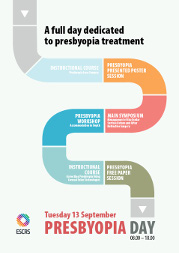Posters
To fear or not to fear? Avoiding refractive surgery complications while planning and having your own PRK
Poster Details
First Author: H. Kiss HUNGARY
Co Author(s): Z. Nagy
Abstract Details
Purpose:
To review the possible complications of the corneal refractive surgeries in a case presentation of the own surgery of an ophthalmologist.
Setting:
Semmelweis University, Department of Ophthalmology
Methods:
Refractive surgeries are performed in an increasing number resulting in a high and standardised quality. High patient satisfaction is well known from our own experience, the literature and the European Registry of Quality Outcomes for Cataract and Refractive Surgery (EUREQUO). Yet when an ophthalmologist decides to undergo this type of surgery, his colleagues try to convince him to reconsider.
Results:
Once the ophthalmologist overcomes the peer-pressure and decides after careful consideration which type of surgery to undergo at what age, suddenly all the possible complications, like wound-healing deficiencies, infections, ectasia, flap related complications, residual refractive error come into his mind. When knowing the complaints of the patients and the discomfort signs, like pain, exacerbation of Meibomian-gland dysfunction, photophobia, slower adjustment of the final refraction, these symptoms can be greeted as old friends, when develop after the ophthalmologist's own surgery, and help him to understand his patients later with even higher empathy.
Conclusions:
Last but not least, at the end of this journey, that an ophthalmologist participates with high curiosity, there is a life without distance corrections, without the discomfort of wearing glasses, that change the size of the image or without the possibility of contact lens related complications. The preoperative alerts and the fears of the complications are faded away as soon as you sit up from the operating table, and after 21 years you can see sharp without any corrections again.
Financial Disclosure:
NONE





